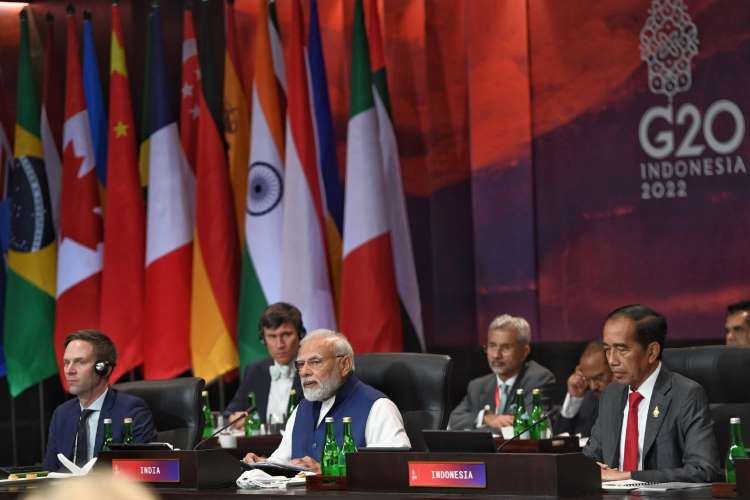
An agenda for India’s G20 presidency: Indonesian President Joko Widodo handed over the presidency of the G20 to Prime Minister Narendra Modi in Bali with the grouping’s leaders in full attendance. In his closing remarks at the Bali Summit, Modi declared that India’s leadership of G20 will be inclusive, ambitious, decisive and action oriented. The speech set the template for G20’s course of action in 2023. The Prime Minister’s template is closely aligned with India’s theme for its presidency — One Earth, One Family, One Future.
The need to tackle global challenges with a sense of collective responsibility and togetherness is evident after a series of events that shook the world in the past few years. The Covid-19 pandemic, supply chain disruptions, the war in Ukraine and its economic fallout had a debilitating impact on the world — pushing back hard-earned socio-economic progress over the years.
Vulnerable groups such as women, children, and people living in the least developed countries (LDCs) have been hit hard by adverse effects of these events. There are serious risks of vulnerable groups being left behind in the quest for collective progress. Structural asymmetries in the contemporary world order have contributed to the widening of inequality.
READ I G20, regional blocks reinvent multilateralism
Challenges for G20 presidency
In such challenging times, it is extremely important that leading economic and political powers of the world manage their differences and pursue a consensus-based strategy to achieve shared prosperity. As the world shrugs off the after effects of multiple crises, India’s G20 presidency presents an opportunity to reset the world order and chart the way for reformed multilateralism.
India’s developmental journey over the last 7 decades has seen it make rapid advancements in economy, health, education, technology, social welfare under a democratic setup. Having come a long way during this period, India understands the developmental challenges faced by developing countries, low- and middle-income countries, and the least developed countries. Prime Minister Modi has already indicated that India’s G20 Presidency will factor in the concerns of its friends in the Global South.
Almost every country in the developed world seeks more comprehensive engagement with India because of its growing stature and capacity to impact key events. India’s unique position to act as a bridge between the developed and developing world enables it to steer the roadmap for equitable growth and development.
India has demonstrated that it possesses the intent and capacity to address complex global problems. When the world faced the deadly Covid-19 pandemic, India dispatched millions of doses of life-saving vaccines to 123 countries along with medicines, therapeutics, diagnostics and other medical equipment. In furtherance of its Neighbourhood First policy, India has been the first responder to crises in countries in its neighbourhood. Be it natural disasters or economic shocks, India has demonstrated its will, time and again, to come to the aid of its neighbours in times of crisis.
India led from the front to restore stability when Sri Lanka was rocked by political upheaval and waves of deadly violence earlier this year. New Delhi provided assistance to the tune of $4 billion to Sri Lanka in the form of credit lines, loans, grants, humanitarian aid to help the latter tide over the crisis. Despite perceived misconceptions of India’s position on the Russia-Ukraine war, it has been pitching for peace, right from the outset. India has consistently called for cessation of hostilities, advocated dialogue and a return to diplomacy between Russia and Ukraine.
India was among the first countries to rush humanitarian aid for Ukraine after the war broke out. Having already supplied 12 consignments of humanitarian aid so far (including essential medicines and medical equipment), India has assured Ukraine that Indian aid would continue to flow to mitigate the suffering of its citizens affected by war.
India’s role in Bali Summit
As world leaders descended on Bali for the G20 Summit, there were concerns that the summit’s output could be jeopardized due to ongoing tensions triggered by the Russia-Ukraine war. PM Modi reiterated that this is not an era for war, a call he originally made at the SCO Summit in September, 2022. India’s deft diplomacy at the summit played a part in ensuring that leaders of G20 member countries articulated their consensus in the declaration on issues of global concern.
The declaration acknowledged that there were different views and assessments of the war and recognised that G20 is not the forum to resolve security issues. It helped G20 leaders forge consensus on key issues and prepare an outline to tackle some of the world’s pressing problems.
As the world prepares itself to deal with contemporary issues, it is essential to revisit the policy mechanisms deployed to make them more effective and relevant. PM Modi outlined the need to reorient the policy architecture in order to achieve desired objectives. His emphasis on themes such as sustainable lifestyle, spirit of climate trusteeship and personal responsibility is indicative of the emergent need to fine tune policy interventions to make them more holistic, participative and meaningful.
The shared pursuit of a sustainable future cannot be achieved only on the basis of responses directed by government systems. The transition towards climate-friendly lifestyles will have a huge bearing on the results of global efforts to address the adverse impact of climate change. As G20 members expressed their commitment to the 2030 Agenda for Sustainable Development, it is essential to take stock of the impact left by the adversities of the past 2-3 years. The principle of just and equitable growth must be the bedrock for accelerating progress on the SDGs.
In light of India’s enlarged role in geopolitical and geoeconomic affairs, it is essential that global institutions reflect the changes which have taken place in the last few decades. Despite its shortcomings, the UN Security Council has demonstrated a typical stubbornness to reform. Its reticence to open permanent membership to countries like India and Brazil reflect its inability to look outside of the bloc. An inward-looking grouping tasked with presiding over global matters of concern is expected to struggle while dealing with global issues.
The Bali declaration identifies the need to address developmental challenges by reinvigorating a more inclusive multilateralism. If leaders of developed countries wish to see this vision materialising, it is essential to take sincere steps in this direction and shed some of their long-standing inhibitions. Absence of timely progress will render their call as just another instance of loose paper talk, further putting the G20’s credibility in question. It is important that this statement is followed up with meaningful action and member countries walk the talk on commitments they have made.
As the world’s fifth largest economy and home to the second largest population, India stands ready to steer the world towards the path of shared prosperity. India’s G20 presidency represents an opportunity to demonstrate its leadership credentials, rooted in the ideals of ‘Vasudhaiva Kutumbakam’ — the world is one family.
(The authors work for CUTS International, a global public policy research and advocacy group.)
Pradeep S Mehta is the Secretary General of CUTS International, a leading policy research and advocacy group. He is a featured columnist with several leading publications in the country.

